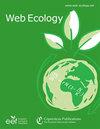Revisiting the debate: documenting biodiversity in the age of digital and artificially generated images
IF 2.4
3区 环境科学与生态学
Q2 ECOLOGY
引用次数: 0
Abstract
Abstract. This study examines the risks associated with relying solely on images for documenting new species records, rediscoveries, taxonomic descriptions, and distribution expansions. We highlight concerns regarding image authenticity, especially in cases where images may be altered, adulterated, or AI (artificial intelligence)-generated, potentially leading to inaccuracies in biodiversity documentation. To illustrate the evolving challenges, we conducted an experiment with 621 participants who assessed nine AI-generated images. Surprisingly, six were deemed authentic, while three raised doubts, highlighting the difficulty in discerning AI-generated content. Our main message emphasizes the critical role of trust in biodiversity documentation, particularly for taxonomy and conservation, and how eroded trust can hinder conservation efforts. Improved communication and collaboration between taxonomists and conservationists are needed, emphasizing scientific integrity. We urge a reevaluation of journal policies concerning data validation, especially in articles relying on images as primary evidence, to preserve the credibility of scientific research amidst technological advancements.重温辩论:记录数字和人工生成图像时代的生物多样性
摘要本研究探讨了仅依靠图像记录新物种记录、再发现、分类描述和分布扩展的相关风险。我们强调了对图像真实性的担忧,尤其是在图像可能被篡改、掺假或由人工智能生成的情况下,这可能会导致生物多样性记录的不准确。为了说明不断变化的挑战,我们进行了一项实验,621 名参与者对九张人工智能生成的图像进行了评估。令人惊讶的是,有六张被认为是真实的,而有三张则引起了怀疑,这凸显了辨别人工智能生成内容的难度。我们的主要信息强调了信任在生物多样性文献中的关键作用,特别是在分类学和保护方面,以及信任的削弱会如何阻碍保护工作。分类学家和保护工作者之间需要加强沟通与合作,强调科学的完整性。我们敦促重新评估有关数据验证的期刊政策,特别是在依赖图像作为主要证据的文章中,以便在技术进步的同时维护科学研究的可信度。
本文章由计算机程序翻译,如有差异,请以英文原文为准。
求助全文
约1分钟内获得全文
求助全文
来源期刊

Web Ecology
Agricultural and Biological Sciences-Ecology, Evolution, Behavior and Systematics
CiteScore
4.60
自引率
0.00%
发文量
6
审稿时长
17 weeks
期刊介绍:
Web Ecology (WE) is an open-access journal issued by the European Ecological Federation (EEF) representing the ecological societies within Europe and associated members. Its special value is to serve as a publication forum for national ecological societies that do not maintain their own society journal. Web Ecology publishes papers from all fields of ecology without any geographic restriction. It is a forum to communicate results of experimental, theoretical, and descriptive studies of general interest to an international audience. Original contributions, short communications, and reviews on ecological research on all kinds of organisms and ecosystems are welcome as well as papers that express emerging ideas and concepts with a sound scientific background.
 求助内容:
求助内容: 应助结果提醒方式:
应助结果提醒方式:


